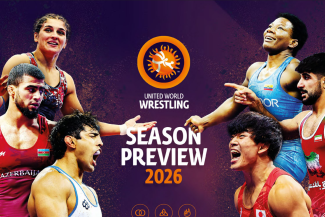CORSIER-SUR-VEVEY, Switzerland (February 2) -- The 2025 World Championships in Zagreb marked a turning point in international wrestling as 18 first-time world champions were crowned, signaling the arrival of a new generation well before the qualification cycle for the Los Angeles 2028 Olympic Games begins.
A few scenes in Zagreb showed what the titles meant. A women’s champion hugging anyone she could find, a Freestyle winner delivering revenge, and a Greco-Roman champion lifting a nation’s pride. Now, 2026 will determine whether those champions can turn a breakthrough into sustained dominance, or if the veterans will reclaim control.
For traditional powers like the United States, Iran, and Japan, maintaining dominance will be harder than ever as more countries close the gap.
In Women’s Wrestling, Japan is being challenged by the DPR Korea, while in Freestyle the U.S. and Iran remain the central rivalry. In Greco-Roman, Iran is undoubtedly the best team in the world but Azerbaijan and Uzbekistan are closing the gap as another strong season approaches.
As wrestling moves toward LA 2028, 2026 becomes the year where storylines start to stick. The UWW Pro Series is part of that shift, taking its final shape before launch. Wrestlers will be rewarded for their ranks for the year and will stand a chance to win a grand prize.
The fans can follow wrestling with United World Wrestling through UWW+ on uww.org, Instagram, Facebook, X, TikTok, YouTube.
Freestyle
A Sadulaev vs Yazdani final at the World Championships. A match-up like no other can happen in 2026.
The 2026 season begins with a question: when will Hassan YAZDANI (IRI) return? A dream match against Abdulrashid SADULAEV (UWW) is now firmly on the cards. Yazdani, the 2016 Olympic champion at 74kg, is now competing at 97kg, ten years later. Sadulaev, who won Olympic gold at 86kg in Rio, moved to 97kg soon after that gold.
The Iranian may compete at the Zagreb Open or at the Tirana Ranking Series. If the return is delayed, world silver medalist Amirali AZARPIRA (IRI) will likely carry the weight for Iran early in the season.
At the same time, several major stars are preparing comebacks. Olympic champion Razambek JAMALOV (UZB) is expected to return after recovering from shoulder surgery, while Rei HIGUCHI (JPN) is also set to resume competition, most likely around May.
READ THE FULL FREESTYLE PREVIEW HERE
Women’s Wrestling
Japan captured five of the 10 medals on offer at the World Championships and nothing less is expected from its wrestlers. But out of the first four weight classes, it managed to win only one gold and missed out on medals in two of them.
Missing a medal at 50kg is rare for Japan. It happened in 2009, then in 2019 and in 2025. So what can be expected from the best country in Women's Wrestling or perhaps wrestling?
The DPR Korea, China, India, Ukraine and the United States keep challenging Japan at various competitions but it has managed to hold its own. With the gap closing, 2026 will be a similar story.
Continental Championships will be the first test for countries building towards the year-ending World Championships. But these tournaments can also witness the returns of a few wrestlers. Yui SUSAKI (JPN), Anastasia NICHITA (MDA), Amit ELOR (USA), Maria YEFREMOVA (UKR), and possibly VINESH (IND).
Additionally, several medal contenders are shifting weight classes in 2026, opening their paths to medals at the World Championships and later at the Olympics.
READ THE FULL WOMEN'S WRESTLING PREVIEW HERE
Greco-Roman
Iran ruled Greco-Roman in 2025 with dominant performances at all levels, and it was not even close. Barring that one battle with Uzbekistan at the U17 World Championships, Iran remained untouched. In 2022 and 2023, it showed signs of long-term dominance and in 2024, it won two gold medals, one silver and one bronze medal at the Paris Olympics. Then in 2025, it won team titles at all age-group levels.
At the World Championships in Zagreb, it won four gold, two silver and two bronze medals. Out of the 10 wrestlers, eight won medals, missing only at 77kg and 60kg. Will 2026 be Iran's year again?
Mohammadhadi SARAVI (IRI), Saeid ESMAEILI (IRI) and Amin MIRZAZADEH (IRI) make the core team. World champion Gholamreza FAROKHI (IRI) has been the latest sensation, going unbeaten in 2025 and winning the U23 world gold at 87kg. Alireza MOHAMADI (IRI) is also a proven wrestler at 87kg having won an Olympic and world silver.
Iran has a second team which can challenge any established star in the world. U20 and U23 world champion Fardin HEDAYATI (IRI) is a wrestler waiting for his turn at 130kg. Hedayati is getting closer to beating Mirzazadeh in selection for the Iran team.
Payam AHMADI (IRI), Alireza ABDEVALI (IRI) and Ahmadi VAFA (IRI) are already part of the team while younger stars wait for their turns.
But there has been an influx of talent in Greco-Roman in the new cycle especially with Uzbekistan, Azerbaijan, Georgia, Japan, Armenia and UWW wrestlers stepping up.
READ THE FULL GRECO-ROMAN PREVIEW HERE



Share your thoughts.
Comments